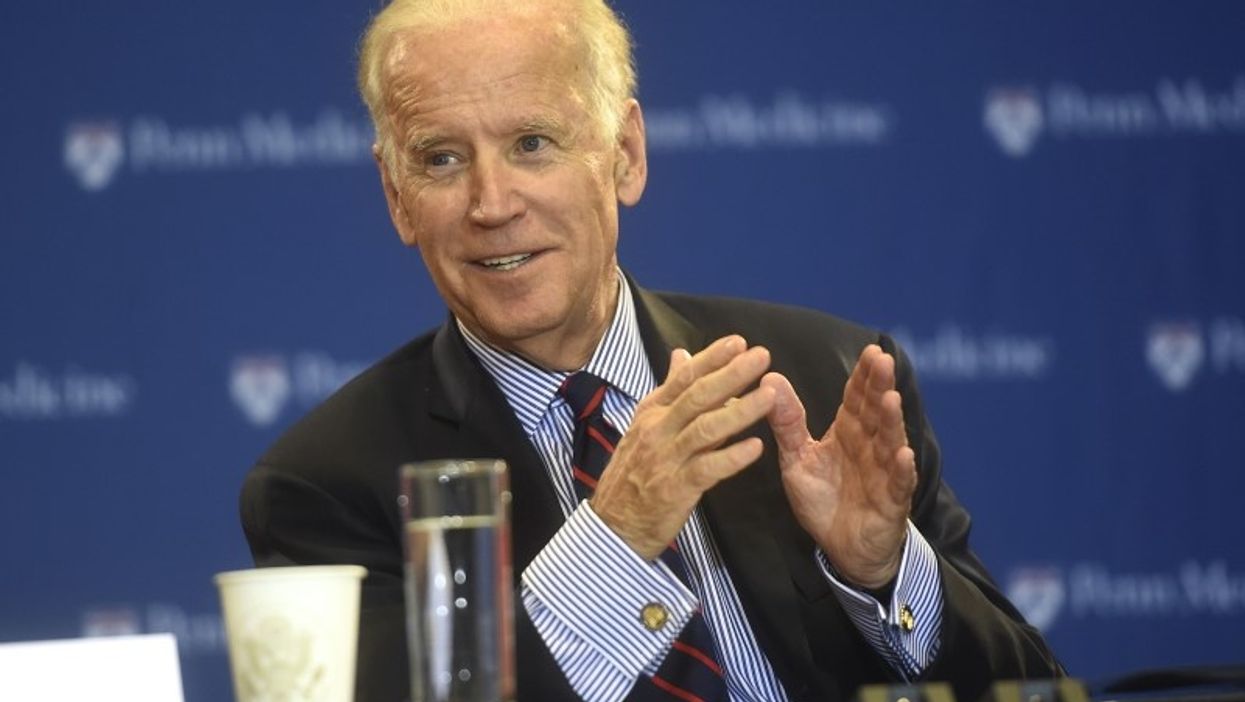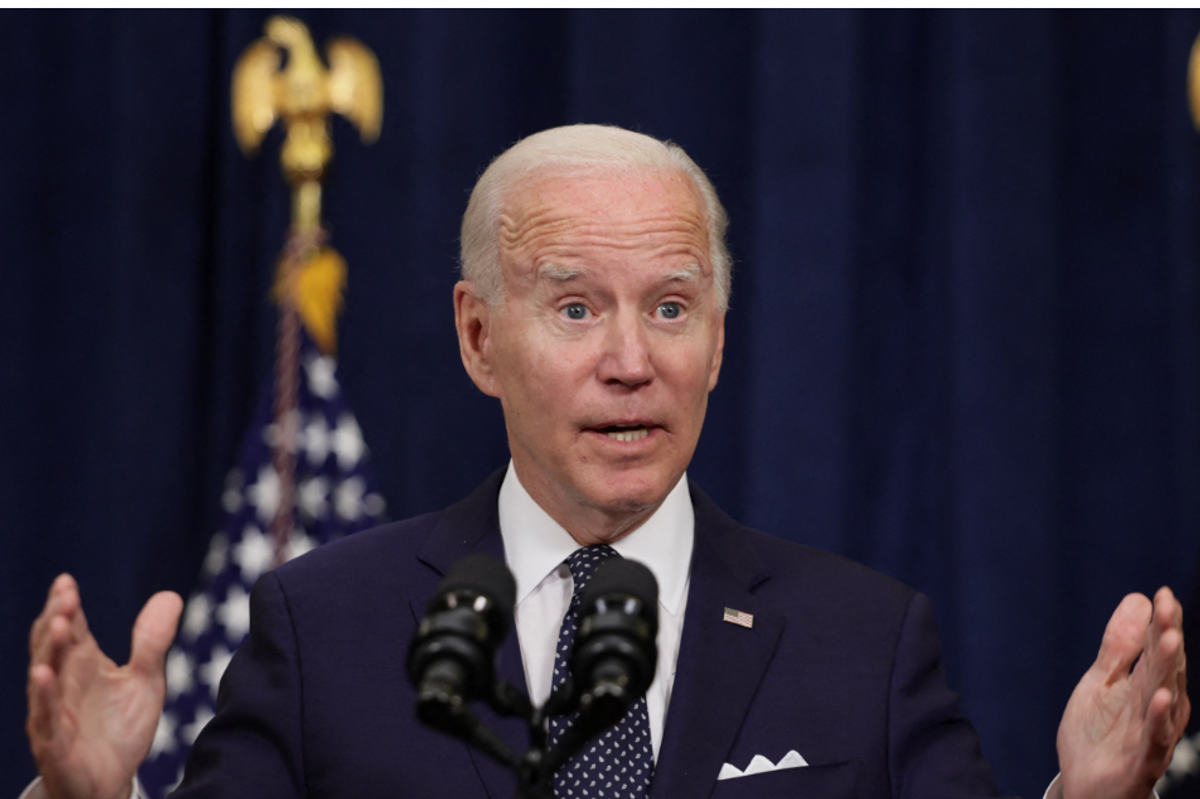Echoing RFK, Biden Converts Progressive Values Into Mainstream Power

This article was produced by Face to Face, a project of the Independent Media Institute.
Former Vice President Joe Biden's stunning Super Tuesday victory, in which he swept at least nine of 14 states, has been attributed mostly to a variety of important tactical developments. These include South Carolina Congressman Jim Clyburn's endorsement, leading to the momentum producing a blowout victory in South Carolina, and the consolidation of moderate candidates such as Pete Buttigieg and Amy Klobuchar behind Biden.
All these were important, but also significant may have been Biden's brilliant appeal to American values in his South Carolina victory speech on the night of February 29. The 12-minute speech, which Biden explicitly directed to a national audience, conveyed a set of values that speak deeply to a broad cross-section of Americans—but which progressives sometimes struggle to articulate.
Biden spoke of faith, family, country, and other values that were reminiscent of another progressive political figure from an earlier era: Robert F. Kennedy. As we note in a new report, RFK's short-lived 1968 campaign for president spoke directly to seven values and had considerable appeal across sometimes-conflicting constituencies.
When Kennedy ran, our country was deeply divided, as it is today. Dr. Martin Luther King Jr. had been killed that spring, race riots set cities on fire summer after summer, and the war in Vietnam raged on, yet RFK found a way to be the candidate most likely in the public's eyes to make progress on race relations and was also seen as the law and order candidate. He had deep support among African Americans and he had appeal to working-class white people; even some who had supported segregationist Alabama Governor George Wallace.
RFK's campaign reflected seven values that we believe were crucial to his broad and deep support. Candidate Biden's South Carolina victory speech hit on many of them. So let's review them in order.
To begin with, RFK punched up, but never down. Robert Kennedy criticized privileged people who didn't pay their fair share of taxes, but he never looked down on less educated whites, the way some contemporary progressives can do. Biden opened his speech in this spirit, "For all those of you who've been knocked down, counted out, left behind. This is your campaign. Just days ago, the press and the pundits had declared this candidacy dead."
He continued, "Stand up and give the poor a fighting chance and the middle class get restored."
Second, RFK represented the importance of family. Kennedy family members were widely known for their loyalty to one another, and Kennedy talked frequently on the campaign trail about his children.
In South Carolina, Biden spoke from the heart about the tragic shooting of nine worshipers at Mother Emanuel church in Charleston four and a half years ago as it related to the importance of family. He explained, "That's why the Sunday after, Jill and I and my family, we came back to Mother Emanuel on Sunday services after the funeral of the victims because six weeks earlier, we had lost our son Beau, and we needed to be healed too. … We needed whatever they were exuding. … We left here, having arrived in overwhelming pain, thinking, 'We can do this. We can get through this.'"
Third, RFK emphasized the patriotic duty of Americans. He believed America was a special country, and that all Americans have a duty to make it better.
In his South Carolina victory speech, Biden conveyed how much he loves this country and how pained he was to see it divided: "This is a battle for the soul of the United States of America. We are in an incredibly perilous moment, as all of you know. Winning means uniting America, not sowing more division and anger. It means not only fighting but healing the country. We have to beat Donald Trump and the Republican Party, but here's the deal: We can't become like them. … We can't have a never-ending war. Above all, it's time for America to get back up."
Then Biden reached to the best ideals of the founders. "The country is so ready, so ready. Once again, fight for the proposition that we hold these truths to be self-evident, that all men and women are created equal, endowed by the creator with certain inalienable rights. We say it all the time, but we've never fully lived up to it. But we've never before until this president walked away from it. And it's the reason why Jim and I and all of us are in this. I believe with every fiber of my being, that all men and women are created equal."
Fourth, RFK signaled a respect for people's religious faith. He took communion with Farm Workers union leader Cesar Chavez, and was at ease using spiritual language that resonates with millions of Americans.
In South Carolina, Biden deeply honored faith as he offered details about Christians at prayer: "You know, I saw it a few days ago in a town hall in Charleston. … I spoke with Reverend Anthony Thompson, whose wife Myra was studying the words of her Bible with eight other parishioners in Mother Emanuel. … It was a weekly routine reading scripture and finding purpose and faith in God and each other."
Fifth, RFK continually underlined the dignity of work. Kennedy favored jobs over welfare, and once remarked: "Unemployment means having nothing to do—which means having nothing to do with the rest of us."
Biden hit this note in South Carolina when he said we need "an economy that works [and that] rewards work, not just wealth. My dad used to say, 'Joe, a job is about a lot more than a paycheck; it's about your dignity. It's about decency; it's respect. It's about your place in the community—being able to look your kid in the eye and say, honey, it's going to be okay.' For all our families, for all our communities, because that's the right thing to do."
Sixth, RFK denounced excessive materialism in favor of what really matters in American life. The gross domestic product, Kennedy said, does not measure "the health of our children, the quality of their education or the joy of their play. … It can tell us everything about America except why we are proud that we are Americans."
Likewise, Biden called us to something deeper, more profound: "you know what I found the most remarkable thing in my career thus far—remarkable about Reverend Thompson and the families of the Emanuel Nine? It's through all that pain, all that grief, they forgave. And here's the deal: In their forgiveness, they brought more change to South Carolina than any that's occurred over the previous 100 years."
He added, "And with every season that's passed, they've gotten up and found purpose to live life worthy of the ones they lost."
Seventh, RFK emphasized the importance of respecting the law. Unlike other candidates in 1968, RFK saw no contradiction between advocating justice and civil rights and also emphasizing that as attorney general, he had been the nation's "chief law enforcement officer."
Biden, likewise, has long supported law enforcement and blended that support with protection of civil rights. In the South Carolina speech, he combined the two by talking about the importance of stamping out hate crimes like the one committed at Mother Emanuel Church.
He rejected the call from some right-wing pundits to use crime as a racial wedge and instead sought to unify people of different races. "We need to build on the coalition and legacy of the most successful president in our lifetime, Barack Obama. And the way we do this is by bringing Americans together of every race, ethnicity, gender, economic station, Democrats, Republicans, Independents, people of every stripe."
As Biden concluded his remarks, he effectively wove together the love of country, commitment to family and a call to something deeper—all the time punching up and not down.
"The days of Donald Trump's divisiveness will soon be over," he said. "This multi-ethnic country we call our democracy, America, it can't survive unless we focus on our goodness. We can build a more perfect union because the American people in the last three and a half years have seen the alternative. … They've seen how utterly mean, selfish, [with a] lack of any sense of empathy or concern for anybody else" President Trump has been. "A president who not only has horrible policies, but the way he mocks and makes fun of other people."
Addressing the audience, Biden said, "We can say without fear of contradiction, the Bidens love you guys, man. The Bidens love you. That's real."
He concluded: "We're better than this present. So, get up; take back our country. This is the United States of America. There's nothing beyond our capacity if we do it together. God bless you all, and may God protect our troops. Thank you, thank you, thank you."
Jim Clyburn said on a CNN interview on March 4 that he needed to "feel" Joe Biden. He elaborated by explaining that sometimes his constituents will say to him, "I hear you, but I need to feel you."
In what some have called Biden's best speech of the campaign, he began to make people "feel" him, in a way that is reminiscent of another very special progressive politician who ran at a time of national division more than a half-century earlier, RFK. While the recent tactical developments (the endorsements for Biden by Clyburn, Buttigieg, and Klobuchar) help explain the resurrection of Joe Biden, something deeper, related to profound American values, may have played a part as well.
Simon Greer is a writing fellow for Face to Face, a project of the Independent Media Institute. He has been involved in social change work for more than 25 years. Greer is the founder of Cambridge Heath Ventures, a strategic advisory firm that works with private sector companies, purpose-driven organizations and governments to help them overcome their most pressing challenges. Greer is also a leading thinker, practitioner and speaker on organizational design, unconventional strategies and common good politics.
Richard D. Kahlenberg is a senior fellow at the Century Foundation and the editor of The Future of Affirmative Action: New Paths to Higher Education Diversity after Fisher v. University of Texas (2014).
- #EndorseThis: Joe Biden's Clarion Call For Justice And Unity - National Memo ›
- The Night RFK Showed America What Leadership Means - National Memo ›
- Biden Is Stuck In The Middle, Comfortably - National Memo ›
- WATCH: Biden's Powerful Acceptance Speech Delights Democrats -- And Stuns Republicans - National Memo ›
- The 1968 RFK Speech On Violence That Joe Biden Should Deliver Now - National Memo ›
- Biden Holding Wisconsin Town Hall To Push For COVID-19 Relief - National Memo ›
- With First Veto, Biden Confronts House GOP Over Pension Plans - National Memo ›


